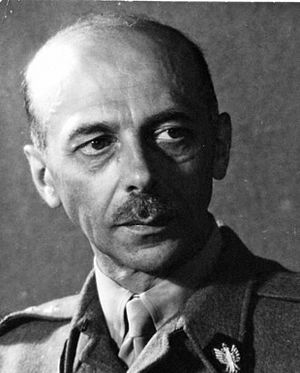Tadeusz Bór-Komorowski facts for kids
Quick facts for kids
General
Tadeusz Komorowski |
|
|---|---|

Komorowski in 1945
|
|
| 4th Prime Minister of the Polish Government in Exile | |
| In office 2 July 1947 – 10 February 1949 |
|
| President | August Zaleski |
| Preceded by | Tomasz Arciszewski |
| Succeeded by | Tadeusz Tomaszewicz |
| Personal details | |
| Born | 1 June 1895 Khorobriv, Kingdom of Galicia and Lodomeria, Austria-Hungary |
| Died | 24 August 1966 (aged 71) London, England |
| Profession | Soldier |
| Awards | |
| Nickname | Bór |
| Military service | |
| Allegiance | |
| Branch/service | |
| Years of service | 1913–1947 |
| Rank | |
| Unit | CO of the Home Army C-i-C of the Polish Army |
| Battles/wars | Great War Polish-Ukrainian War Polish–Bolshevik War World War II
|
Generał Tadeusz Komorowski (born June 1, 1895 – died August 24, 1966) was a brave Polish military leader. He was also known by his wartime code-name, Bór-Komorowski. The word Bór means "The Forest" in Polish.
Komorowski became the commander-in-chief of the Polish forces just before the end of the Warsaw Uprising. After World War II, he served as the 32nd Prime Minister of Poland for the Polish government that was in exile in London.
Contents
Early Life and Military Career
Tadeusz Komorowski was born in Khorobriv, a town in what was then the Kingdom of Galicia and Lodomeria. This area was part of the Austrian partition of Poland.
During World War I, he served as an officer in the Austro-Hungarian Army. After the war, he joined the Polish Army. He rose through the ranks and eventually commanded the Cavalry School in Grudziądz.
Komorowski was also a talented horseman. He was part of the Polish equestrian team that competed in the 1924 Summer Olympics.
Leading the Home Army
When World War II began in 1939, Nazi Germany invaded Poland. Komorowski, using his code-name Bór, helped organize the Polish underground resistance in the Kraków area.
In July 1941, he became the deputy commander of the Home Army. This was Poland's main underground resistance force. In March 1943, he was promoted to commander of the Home Army, with the rank of Brigadier-General.
As commander, Komorowski made some changes to the Home Army's policies. He was concerned about the influence of communist groups within the resistance.
The Warsaw Uprising
In mid-1944, Soviet forces were moving closer to central Poland. The Polish government-in-exile in London wanted the Polish capital, Warsaw, to be freed by Poles, not by the Soviets. They hoped this would prevent a communist takeover of Poland.
So, the government-in-exile ordered Bór-Komorowski to prepare for a major armed uprising in Warsaw. The Warsaw uprising began on August 1, 1944, under Komorowski's command. The Home Army fighters took control of most of central Warsaw.
On September 29, 1944, Bór-Komorowski was promoted to General Inspector of the Armed Forces, which meant he was the Polish Commander-in-Chief.
After two months of very intense fighting, Bór-Komorowski surrendered on October 4, 1944. This happened after Nazi Germany agreed to treat the Home Army fighters as prisoners-of-war. General Bór-Komorowski was then held in a prisoner-of-war camp in Germany. Even though he was asked many times, he refused to order other Home Army units in Occupied Poland to surrender.
Life After the War
After World War II ended, Bór-Komorowski moved to London, England. He remained active in Polish groups living outside of Poland.
From 1947 to 1949, he served as the Prime Minister of the Polish government-in-exile. However, by this time, most Western countries no longer officially recognized this government.
He wrote a book about his experiences during the war called The Secret Army (published in 1950). In his later life, he worked as an upholsterer.
Death and Burial
Tadeusz Komorowski passed away in London on August 24, 1966, at the age of 71. He was first buried in Gunnersbury Cemetery in London.
Years later, on July 30, 1994, his ashes were brought back to Poland. They were reburied with honors in the Powązki Military Cemetery in Warsaw.
Awards and Recognition
General Tadeusz Komorowski received many important honors for his service and bravery:
- Order of the White Eagle (awarded after his death in 1995)
- Commander's Cross of the Order of Virtuti Militari (he had also received the Knight's Cross, Gold Cross, and Silver Cross of this order)
- Grand Cross of the Order of Polonia Restituta (he had also received the Officer's Cross)
- Cross of Valour – three times
- Gold Cross of Merit with Swords
- Gold Cross of Merit
- Silver Cross of Merit
- Honorary citizen of Glowno (awarded after his death in 2004)
See also
 In Spanish: Tadeusz Bór-Komorowski para niños
In Spanish: Tadeusz Bór-Komorowski para niños
- Operation Tempest
- Warsaw Uprising
 | Bayard Rustin |
 | Jeannette Carter |
 | Jeremiah A. Brown |

